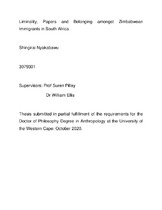| dc.contributor.advisor | Pillay, Suren | |
| dc.contributor.advisor | Ellis, William | |
| dc.contributor.author | Nyakabawu, Shingirai | |
| dc.date.accessioned | 2021-03-09T08:17:11Z | |
| dc.date.available | 2021-03-09T08:17:11Z | |
| dc.date.issued | 2020 | |
| dc.identifier.uri | http://hdl.handle.net/11394/7942 | |
| dc.description | Philosophiae Doctor - PhD | en_US |
| dc.description.abstract | Introduced in 2010, the Dispensation Zimbabwe Program (DZP) regularised undocumented Zimbabwean immigrants in South Africa. When DZP was closed, the Zimbabwe Special Permit was introduced, which was also replaced by the Zimbabwe Exemption Permit. This thesis examines the lived experiences of Zimbabwean migrants from the time they arrived in South Africa without papers, visas, or permits. It then examines the processes of acquiring DZP papers, processes of replacing it, and how conditions on the permits reinforce a particular notion of belonging for Zimbabwean immigrants. I draw on work inspired by the anthropologist Victor Turner’s (1967) concept of liminality to show that Zimbabwean migrants had been going through various phases of uncertain legal statuses which are all liminal. | en_US |
| dc.language.iso | en | en_US |
| dc.publisher | University of the Western Cape | en_US |
| dc.subject | Immigrants | en_US |
| dc.subject | Zimbabwe | en_US |
| dc.subject | South Africa | en_US |
| dc.subject | DZP papers | en_US |
| dc.subject | Permits | en_US |
| dc.title | Liminality, papers and belonging amongst Zimbabwean immigrants in South Africa | en_US |
| dc.rights.holder | University of the Western Cape | en_US |

